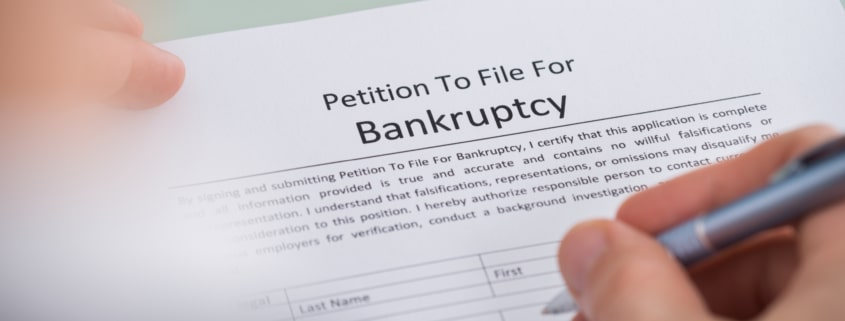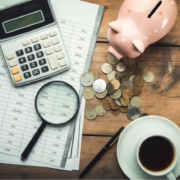Understanding Chapter 7 Bankruptcy, Debts, and Liability
Business owners struggling to pay their monthly bills can easily become overwhelmed by debt. Running a business is hard enough, but when you add crippling credit card and loan debt into the mix, owners can find themselves in impossible situations.
When times get especially tough, many business owners consider filing for chapter 7 bankruptcy. If this sounds familiar, keep reading to learn about how this decision might affect your personal finances depending on how you’ve structured your business.
What Is Chapter 7 Bankruptcy?
Chapter 7 bankruptcy is the most common type of bankruptcy in the United States and is sometimes referred to as “liquidation bankruptcy.” When a person files chapter 7, a court-appointed trustee seizes their more valuable assets, sells those assets at auction, and uses the proceeds to pay the person’s creditors.
In chapter 7, individual bankruptcy filers may keep certain “exempt property items,” which are goods and equity they need to support themselves and their families. Exempt property can include home equity, furniture, clothing, vehicles, and a sustainable amount of wages, among other items.
However, businesses and corporations that file for chapter 7 bankruptcy are not allowed exempt property, which means the trustee liquidates all their assets to pay their creditors. So, if you’re considering filing bankruptcy and want to hold on to your assets, you should make sure you understand the rules regarding chapter 7 bankruptcy.
RELATED BLOG ARTICLE: Discharging Tax Debts in a Bankruptcy
Personal Liability for Business Debts in Chapter 7 Bankruptcy
Individuals who are personally liable for business debts or who have signed a personal guarantee can often eliminate their responsibility by filing chapter 7 bankruptcy, but only after selling off their non-exempt assets to pay creditors. In most cases, individuals must meet certain income requirements to qualify, but you may be able to avoid the income-qualifying chapter 7 means test if your business debts add up to more than your personal debts.
Whether you are personally liable for business debts when filing chapter 7 bankruptcy depends on how you structured your business and whether you originally agreed to assume responsibility for your business-related debts. In most cases, partners in a partnership and sole proprietors will be responsible for their business debts.
On the other hand, business partners with an interest in a corporation, LLC, or other business type usually receive protection from financial liability, although certain exceptions apply. For instance, courts will sometimes “pierce the corporate veil” by empowering trustees to force shareholders to make payments on debts.
Types of Business Structures and How They Impact Chapter 7 Bankruptcy
When filing for chapter 7 bankruptcy, your personal liability will be determined by how you set up your business.
-
Sole Proprietorship
If you’re the sole owner of your business and you haven’t established a specific business entity, you’re likely liable for business-related debts. This fact means your creditors can pursue your personal and business assets if you file chapter 7, and they can even sue you or repossess your property if you don’t have enough assets to offset the debt.
-
Partnerships
If you share ownership with one or more other individuals, your liability will probably resemble that of a sole proprietorship, although exceptions may apply based on your specific partnership status.
-
-
General Partnership
When two or more people engage in business together, they automatically enter into a general partnership and immediately become personally liable for the partnership’s debts without filing or signing any paperwork.
-
Limited Partnership
Limited partnerships involve one or more general partners who are personally liable for business debts and one or more limited partners who are safe from personal liability.
-
Limited Liability Partnership
More commonly known as LLPs, limited liability partnerships eliminate personal liability for business debts for all partners. In Maryland, any business with at least two partners can become an LLP, but they must designate a resident agent to accept and execute important paperwork.
-
-
Corporation
Corporations are designed to limit shareholders’ liability, which forces creditors to pursue the company’s assets rather than its owners’ property and wages. However, if one or more shareholders signed a personal guarantee (see below), used the company as a shell, or mixed their personal and business funds, their personal assets could become subject to seizure and sale during a chapter 7 bankruptcy.
-
Limited Liability Company
More commonly known as an LLC, limited liability companies include members (owners) who are not liable for their business debts unless they signed a personal guarantee or used the company’s funds improperly.
A Personal Guarantee Makes Business Owners Liable for Their Debts
When business owners sign a personal guarantee on a loan, they agree to accept personal liability for any debts their business cannot pay in the future. Common business purchases, such as leasing office space or buying real estate, often require business owners to provide such a guarantee.
In most cases, creditors require business owners to show proof of personal collateral before signing a personal guarantee. This helps protect the creditor in the case of default, especially when dealing with new businesses or a company without many assets. You should speak with a tax professional or financial advisor before signing a personal guarantee; failing to do so could prove devastating if you eventually decide to file for chapter 7 bankruptcy.
RELATED BLOG ARTICLE: Resolving Tax Debt for Small Businesses
S.H. Block Tax Services Can Help You Navigate Chapter 7 Bankruptcy
At S.H. Block Tax Services, we understand how filing for chapter 7 bankruptcy can impact your personal and professional finances. Our attorneys and staff have years of experience helping clients resolve tax liabilities and other financial matters, and our firm has earned an A+ rating with the Better Business Bureau.
If you’re considering filing for chapter 7 bankruptcy but aren’t sure how it will affect your bottom line, please contact us to schedule your free consultation. Call (410) 872-8376 or complete this brief form and one of our skilled and experienced tax resolution attorneys will speak with you about your current financial status and how we might be able to help resolve those issues and get you back on track.
The content provided here is for informational purposes only and should not be construed as legal advice on any subject. Please read our full disclaimer here.












Leave a Reply
Want to join the discussion?Feel free to contribute!